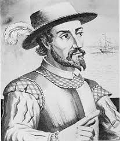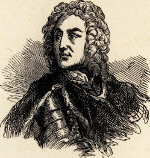The Making of the 50 States: Georgia
Part 1: In the Beginning Like the other 13 Colonies, Georgia was early inhabited by Native Americans, among them the Creek and Cherokee. The Cherokee called Georgia "The Enchanted Land."
The first English settlers in Georgia were led by Dr. Henry Woodward. Woodward got many Native Americans fearful of Spanish soldiers to fight for England in a large battle in 1680. England won this battle, and the Spanish withdrew to coastal Sapelo Island. Four years later, the Spanish were gone for good. (It is helpful to remember that what we now call Georgia was, at that time, at the center of a struggle between English settlers in the South Carolina colony and Spanish settlers in Florida.) In 1715, war between England and Spain again engulfed Georgia. Two years later, Sir Robert Montgomery proposed what he hoped would be an English settlement in the midst of so much fighting. He called it the Margravate of Azilia. (This was a really fancy name for what was, in fact, a planned settlement that was an early version of later American cities.) In 1724 Jean Pierre Purry proposed a settlement named Georgina, in honor of King George I. Nine years later, in 1733, the colony of Georgia was born. King George I's successor, King George II, had signed the royal charter in 1732.
Next page > The Rest of the Story > Page 1, 2
|
|
Social Studies for Kids
copyright 2002–2026
David White



 European
exploration of Georgia is thought to have begun with
European
exploration of Georgia is thought to have begun with  James Oglethorpe">The
driving force behind the success of the Georgia colony was
James Oglethorpe">The
driving force behind the success of the Georgia colony was

